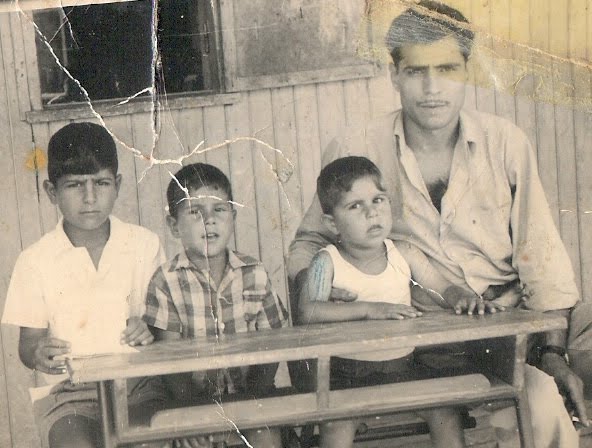The Persecution Of Jews In Iraq
Today is the 70th anniversary of the Farhud, a "violent dispossession" or pogrom against Iraq's Jews which took place on June 1, 1941.
Haj Amin al-Husseini, the Grand Mufti of Jerusalem and one of the initial members of the Muslim Brotherhood, became a Nazi agent after meeting Adolf Eichmann, an architect of the Holocaust, in 1937. With Nazi funds al-Husseini organized the Arab Revolt of 1936-39, which led to the British stopping Jewish immigration to modern day Israel. This facilitated the "Final Solution" by closing off the avenue of refuge. In 1941, the mufti orchestrated a short-lived, Nazi-backed generals' coup in Iraq. The coup was followed by the Farhud, a pogrom against Baghdad's Jews.
The Mufti obtained Hitler's assurance in November 1941 that after dealing with the Jews of Europe, Hitler would treat the Jews of the Middle East similarly.
In a two-day period Arab mobs went on a rampage in Baghdad and other cities in Iraq. At least 150 Jews were killed and more than 2,000 injured; some 900 Jewish homes were destroyed and looted; and hundreds of Jewish-owned shops were robbed and destroyed.

Eventually, when being a Jew was practically criminalized, my father's family escaped to Israel with only the clothes on their backs—their belongings were confiscated—leaving behind everything that they knew.
For Iraqi Jews the Farhud is comparable to Kristallnacht, a Nazi pogrom carried out in Germany and Austria.
While the situation of the Jews fluctuated under Islamic rule in modern-day Iraq, some leaders were merciful. In some cases Jews held high positions in government or prospered in commerce and trade. At the same time, throughout history, Jews were subjected to special taxes, restrictions on their professional activity, and anti-Jewish incitement among the masses. The situation changed for the better under during British rule, which began in 1917. Jews and other social minorities fared better economically and many were elected to government posts. This traditionally observant community was also allowed to found religious organizations and to pursue Hebrew studies.
All of this progress ended when Iraq gained independence in 1932. Nazi propaganda and antisemitism had a huge presence on Iraqi radio broadcasts. Mein Kampf had been translated into Arabic by Yunis al-Sab'awi, and was published in a local newspaper, Al Alam al Arabi (The Arab World), in Baghdad during 1933-1934. Yunis al-Sab'awi also headed the Futtuwa, a pre-military youth movement influenced by the Hitlerjugend (Hitler Youth) in Germany. Al-Sab'awi eventually became a minister in the new Iraqi government.
Although emigration was prohibited, many Jews made their escape to Israel during this period. Many had come to terms with the fact that Iraq was no longer safe.
In 1950 the Iraqi parliament finally legalized emigration to Israel, and between May 1950 and August 1951, the Jewish Agency and the Israeli government succeeded in airlifting approximately 110,000 Jews to Israel in Operations Ezra and Nehemiah. This figure includes 18,000 Kurdish Jews, who have their own distinct traditions and customs. Some 20,000 refugees from this region were smuggled out through Iran.
In 1952, Iraq's government barred Jews from emigrating and publicly hanged two Jews after falsely charging them with hurling a bomb at the Baghdad office of the U.S. Information Agency.
With the rise of competing Ba'ath factions in 1963, additional restrictions were placed on the remaining Iraqi Jews. The sale of property was forbidden and all Jews were forced to carry yellow identity cards. After the Six-Day War, more repressive measures were imposed: Jewish property was seized; Jewish bank accounts were frozen; Jews were dismissed from public posts; businesses were shut; trading permits were canceled; telephones were disconnected. Jews were placed under house arrest for long periods of time or restricted to the cities.
In 1968, 14 men, 11 of them Jewish, were sentenced to death in staged trials and hanged in the public squares of Baghdad and others died of torture. On Jan. 27, 1969, Baghdad Radio called upon Iraqis to "come and enjoy the feast." 500,000 men, women and children in Iraq paraded and danced past the scaffolds where the bodies of the hanged Jews swung; the mob rhythmically chanted "Death to Israel" and "Death to all traitors." This display brought a worldwide public outcry that Baghdad Radio dismissed by declaring: "We hanged spies, but the Jews crucified Christ."
The Iraqi Jewish population once numbered at 150,000 in 1947. Today there are seven Jews living in Iraq who hide their Jewish identity and live in fear. This once vibrant community has been totally ethnically cleansed and destroyed.
But they have not been forgotten.



